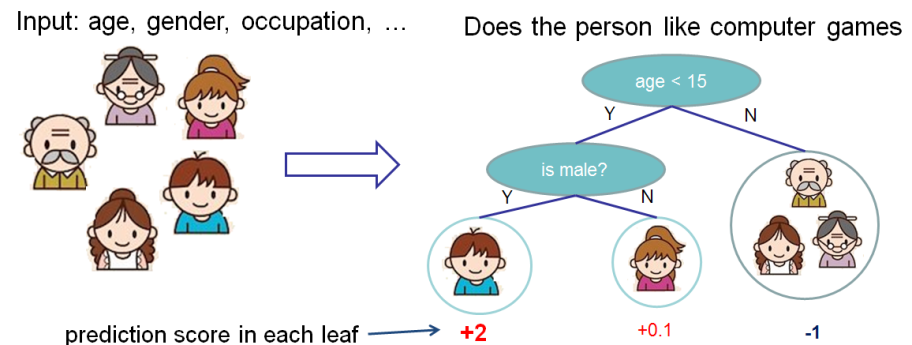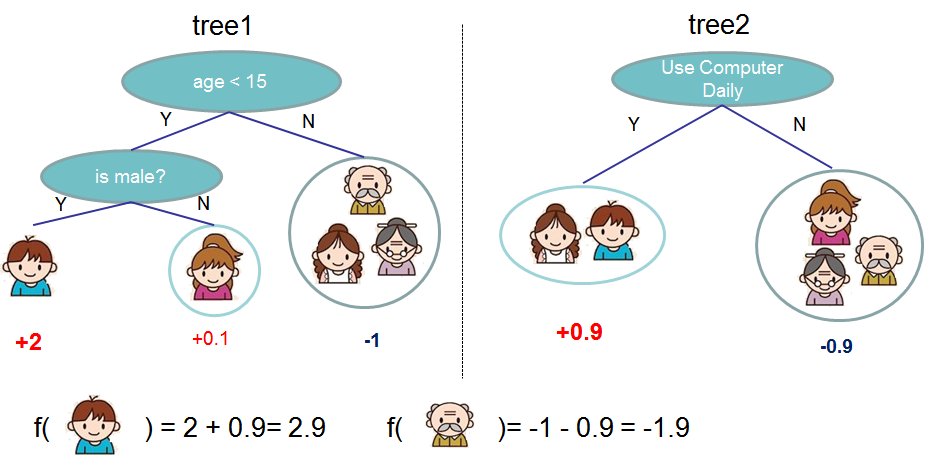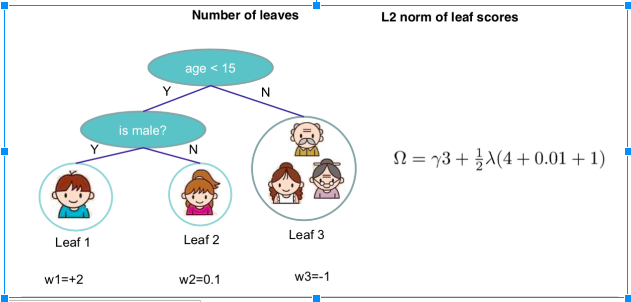XGBoost: A Scalable Tree Boosting System: Difference between revisions
No edit summary |
|||
| Line 36: | Line 36: | ||
Let's look at <math>\hat y_i</math> | Let's look at <math>\hat y_i</math> | ||
<math>\hat y{i}^{(0)} = 0</math> | <math>\hat y{i}^{(0)} = 0</math> | ||
<math>\hat y{i}^{(1)} = f_1(x_i)=\hat y_i^{(0)}+f_1(x_i)</math> | <math>\hat y{i}^{(1)} = f_1(x_i)=\hat y_i^{(0)}+f_1(x_i)</math> | ||
<math>\hat y{i}^{(2)} = f_1(x_i) + f_2(x_i)=\hat y_i^{(1)}+f_2(x_i)</math> | <math>\hat y{i}^{(2)} = f_1(x_i) + f_2(x_i)=\hat y_i^{(1)}+f_2(x_i)</math> | ||
... | ... | ||
<math>\hat y{i}^{(t)} = \sum^t_{i=1}f_k(x_i)=\hat y_i^{(t-1)}+f_t(x_i)</math> | <math>\hat y{i}^{(t)} = \sum^t_{i=1}f_k(x_i)=\hat y_i^{(t-1)}+f_t(x_i)</math> | ||
Revision as of 00:33, 22 November 2018
Presented by
- Qianying Zhao
- Hui Huang
- Lingyun Yi
- Jiayue Zhang
- Siao Chen
- Rongrong Su
- Gezhou Zhang
- Meiyu Zhou
2 Tree Boosting In A Nutshell
2.1 Regularized Learning Objective
1. Regression Decision Tree (also known as classification and regression tree):
- Decision rules are the same as in decision tree
- Contains one score in each leaf value
2. Model and Parameter
Model: Assuming there are K trees [math]\displaystyle{ \hat y_i = \sum^K_{k=1} f_k(x_I), f_k \in Ƒ }[/math]
Object: [math]\displaystyle{ Obj = \sum_{i=1}^n l(y_i,\hat y_i)+\sum^K_{k=1}\omega(f_k) }[/math]
where [math]\displaystyle{ \sum^n_{i=1}l(y_i,\hat y_i) }[/math] is training loss, [math]\displaystyle{ \sum_{k=1}^K \omega(f_k) }[/math] is complexity of Trees
So the target function that needed to optimize is:[math]\displaystyle{ \sum_{i=1}^n l(y_i,\hat y_i)+\sum^K_{k=1}\omega(f_k), f_k \in Ƒ }[/math], where [math]\displaystyle{ \omega(f) = \gamma T+\frac{1}{2}\lambda||w||^2 }[/math]
Let's look at [math]\displaystyle{ \hat y_i }[/math]
[math]\displaystyle{ \hat y{i}^{(0)} = 0 }[/math]
[math]\displaystyle{ \hat y{i}^{(1)} = f_1(x_i)=\hat y_i^{(0)}+f_1(x_i) }[/math]
[math]\displaystyle{ \hat y{i}^{(2)} = f_1(x_i) + f_2(x_i)=\hat y_i^{(1)}+f_2(x_i) }[/math]
...
[math]\displaystyle{ \hat y{i}^{(t)} = \sum^t_{i=1}f_k(x_i)=\hat y_i^{(t-1)}+f_t(x_i) }[/math]


